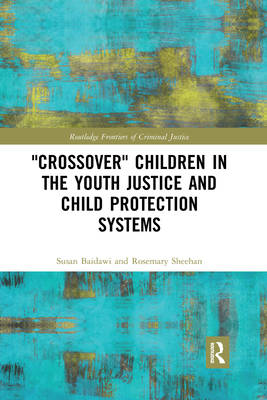
- Retrait gratuit dans votre magasin Club
- 7.000.000 titres dans notre catalogue
- Payer en toute sécurité
- Toujours un magasin près de chez vous
- Retrait gratuit dans votre magasin Club
- 7.000.0000 titres dans notre catalogue
- Payer en toute sécurité
- Toujours un magasin près de chez vous
'Crossover' Children in the Youth Justice and Child Protection Systems
Susan Baidawi, Rosemary SheehanDescription
"Crossover" Children in the Youth Justice and Child Protection Systems explores the outcomes faced by the group of children who experience involvement with both child protection and youth justice systems across several countries, including the United States, United Kingdom, Canada, New Zealand, and Australia.
Situated against a backdrop of international evidence and grounded in a two-year study with the Children's Court in Victoria, Australia, this book presents a cohesive picture of the backgrounds, characteristics, and pathways traversed by crossover children. It presents statistical data from 300 crossover Children's Court case files, alongside the expert evidence of 82 professionals, to generate a comprehensive picture of the lives of crossover children, and the individual and systemic challenges that they face. The book investigates the crucial question of why some children involved with child welfare systems experience particularly poor criminal justice outcomes, demonstrating how the convergence of cumulative childhood adversity, complex support needs, and systemic disadvantage produces acutely damaging outcomes for some crossover youth. It outlines the implications of the study, including how these findings might shape diversion and differential justice system responses to child protection-involved youth, and the innovative approaches adopted internationally to avert the care to custody pathway.
This book is internationally relevant and will be of great interest to students and scholars of criminology and law, social work, psychology, and sociology, as well as legal, welfare, and government agencies and policy developers, non-government peak bodies and services, professional probation services, case managers, health and mental health services, disability and drug treatment agencies, and others who work with both young offenders and the design and implementation of policy and legislation.
Spécifications
Parties prenantes
- Auteur(s) :
- Editeur:
Contenu
- Nombre de pages :
- 160
- Langue:
- Anglais
- Collection :
Caractéristiques
- EAN:
- 9781032176390
- Date de parution :
- 30-09-21
- Format:
- Livre broché
- Format numérique:
- Trade paperback (VS)
- Dimensions :
- 156 mm x 234 mm
- Poids :
- 235 g

Les avis
Nous publions uniquement les avis qui respectent les conditions requises. Consultez nos conditions pour les avis.






